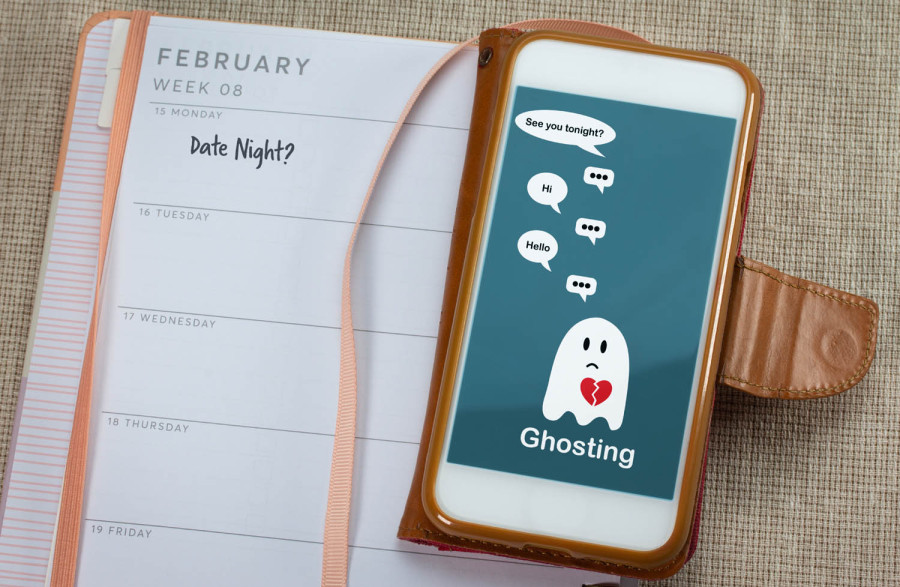Culture & Lifestyle
When your boo becomes a ghost
A sudden halt in communication, especially from near ones, can be a difficult experience. Here’s how to express yourself clearly even during hard times.
Apecksha Gurung
Communicating one’s feelings can be difficult at times, especially when they are not reciprocated. Humans are social animals, and in order to live in a community, one must interact with others and communicate well. A modern colloquial term has made its way into our public discourse–ghosting. Ghosting occurs when people quickly sever communication with someone without providing them with any notice or justification. In an interview with the Post, clinical psychologist Suraj Shakya, who works at the Teaching Hospital in Maharajgunj, breaks down the reasons behind ghosting and communication incompetence.
Ghosting in relationships is common these days. Why is it so?
This term has been popular in the last decade, especially after the rise in online dating. Sadly, there hasn't been enough research on why it happens. But probable reasons might be: some people cut off from others suddenly as it is easier to escape than to confront. Some lose interest in partners, or they are busy or have other choices and find ghosting easier than having a mature closure. One of the common issues might be a lack of communication skills and resorting to ghosting as an easy way out.
What can we do when we get ghosted?
A qualitative study from Italy showed that the person being ghosted might go through various stages of reaction like surprise and confusion, anger, sadness, and guilt, attempts of relational repair and finally, acceptance. Rejection from anyone in a relationship is never a pleasant experience, and we start either blaming ourselves or others. Let’s remember that the act of blaming only makes things worse for our mental health. There might be feelings of shame and inferiority after being rejected. We have to be compassionate to ourselves and work on this feeling of shame. To deal with these distresses, one of the best things is to have a good self-care plan and follow that. Self-care plans can differ per individual, but the common ones people use are eating a balanced diet, exercising (some prefer even yoga or meditation), separating time to follow hobbies, sharing with someone who can listen to you, minimising excessive screen time, getting proper rest and asking for professional help if required.
Why are some people socially awkward?
Feeling uncomfortable and out of place in social settings is a spectrum. Though there are no specific answers, the general answer could be genetics, temperament (influenced by personality type), upbringing, family, society and ongoing learning opportunities. There might be many psychological matters involved as well. Two important aspects which can help us become less socially awkward are how we process information, and our thoughts about our social performances.
What is communication competence?
Communication competence is about being able to share your views and feelings verbally—by speaking or writing—and non-verbally so that two people communicating can come to a healthy conclusion. It occurs when parties follow a win-win approach. It also requires knowledge, attitude and skill. You are ready to listen to someone from their perspective. Good listening skill is required prior to becoming a good speaker.
How would you describe effective communication?
It is a two-way process. The person conveying feelings and messages is clear about what they are conveying, and the receiver is clear about the message they are receiving. The communicator conveys it in such a way that both communicator and the receiver benefit from the communication.

For instance, a parent wants to warn their child about excessive screen time. If they start screaming at the child about this without clearly explaining what is so wrong with their excessive screen time, the child misses the message.
Why do we need to be competent communicators?
The majority of conflicts are a consequence of misunderstandings and problems in communication. Being good communicators enables us to express our feelings, needs and desires in a clear and respectful manner while also being able to listen actively and understand the perspectives of others. It is required in personal relationships, while making connections with others, and to find success in the workplace—situations where we must convey our ideas and information clearly, collaborate with others and resolve conflicts. Without being a good communicator, it is difficult to reach our goal.
What role do facial expressions, gestures and pauses play in communication?
Nonverbal clues like facial expressions, gestures and pauses are often more important and convey more meaning than what is said verbally. Let’s say a colleague is interested in your project. Your colleague’s expression, gestures and other nonverbal cues are subtle messages that will convince you of their ‘genuine’ interest. We should spend time reflecting on ourselves (like our values, aspiration, belief system, likes and dislikes) so that we don’t have to superficially work on these nonverbal cues while communicating.
Do you believe that young people could benefit from communication courses?
As mentioned earlier, most of the frustrations we have are from us not being able to communicate well on what we believe as well as not being able to form good social connections. Some human beings are inherently built with good communication skills. However, many learn as life goes on.
Let’s take a simple example. Someone makes a rude comment about your social media status. Now, how will you deal with this comment? You can either be reactive or keep calm and rationalise the process. This is what you are taught in communication courses. Learning to be an assertive communicator instead of a submissive one is largely about learning skills over time.
Is there a way we can measure or assess effective communication?
Yes, there are many self-measures developed to assess your communication skills. The easiest is simply to ask a few people you trust about your communication effectiveness. You could ask your family, friends, colleagues, trusted customers and so on. Observing role models communicate can help you learn specific skills.
Online resources are also a great way to improve. Learned skills can be rehearsed alone in front of a mirror or with someone you trust. The most important thing is finding opportunities to interact and communicate. Trust yourself and face the fear gradually.
You can reach Shakya at [email protected].




 9.93°C Kathmandu
9.93°C Kathmandu















